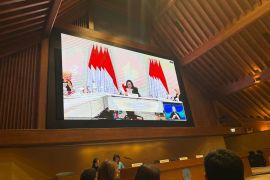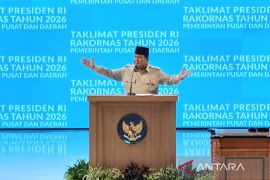"The effect of these efforts can be seen from the lowering of public transport fares, electricity tariffs and Pertamax gasoline prices. The steps resulted in deflation and helped curb inflation during the month of May," Deputy of Distribution and Services Statistics at the countrys statistics maintaining agency (BPS), Sasmito Hadi Wibowo, said here on Wednesday.
"If you look at the government intervention, good steps have been taken. Inflation should be kept under control until July," he advised.
The Central Agency of Statistics (BPS) recorded inflation at 0.24 percent. Inflation rate for the first five months of this calendar year (January-May) 2016 was 0.4 percent.
The food category accounted for 0.30 percent, food, beverages, cigarettes and tobacco 0.58 percent, housing, water, electricity, gas and fuel 0.02 percent, clothing 0.44 percent, health 0.27 percent, education, recreation and sports 0.03 percent, and the group of transport, communication and financial services 0.21 percent.
The prices of commodities such as chili, rice, tomatoes, fresh fish and tomatoes declined.
Some commodities contributing to the monthly inflation rate are chicken, sugar, eggs, cooking oil, potatoes, apples and oranges.
"Chicken prices rose due to the high demand in the face of the Ramadan fasting month," he remarked.
Wibowo pointed out that the inflation rate can be maintained during the fasting month of Ramadan and the Idul Fitri, locally known as Lebaran festivities, as long as the government continues to ensure supplies of food and maintains fuel prices as well as other necessities.
Earlier, State-owned Enterprises Minister Rini Soemarno, Agriculture Minister Amran Sulaiman, Trade Minister Thomas P. Lembong and President Director of state-owned PT Berdikari Suwhono took part in the coordination meeting.
After attending the meeting, the three ministers were reluctant to speak to the press regarding the agenda of their meeting.
Minister Sulaiman revealed that the coordination meeting focused on production, distribution lines and prices.
Meanwhile, the House of Representatives (DPR) has called on the government to stabilize commodity prices in the face of the Ramadan fasting month.
"I hope that prices would not fluctuate too much in the coming fasting month. The presidents aides should work together towards this end," Herman Khaeron, the deputy chairman of Commission IV on food affairs of the DPR, advocated here on Sunday.
He cautioned that the presidents aides should speak in one voice and come up with policies dealing with food stuff in such a way that it does not disadvantage the people.
Herman made the remarks in response to the governments plan to import shallots and the controversy among the presidents aides regarding plans to import the commodity.
"Shallot import should not harm the interest of farmers," he warned.
Herman, who is a politician of the Democratic Party, pleaded that Agriculture Minister Amran Sulaiman should increase shallot production and manage supplies better after the harvest season.
He also suggested that the commodity should be preserved so that its shelf life increases.
"Shallot is categorically a perishable commodity. Therefore, the agriculture ministry should do some homework to find ways to increase shallot production and preserve it," he stated.
The legislator also deplored the statement of the agriculture minister which said that shallot production was adequate and its prices will remain stable in the run up to the fasting month.
He claimed that, in fact, on the ground, the price of shallots was high. The minister should plan how domestic production can be supplied to consumers at home to meet their needs in full.
"The price at the farmers level should also be improved," he emphasized.(*)
Editor: Heru Purwanto
Copyright © ANTARA 2016











